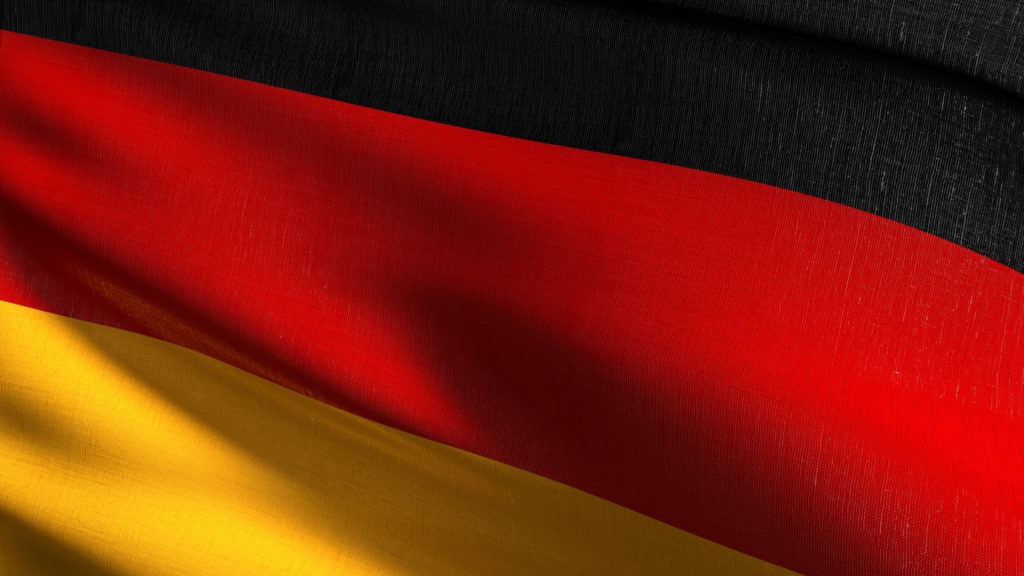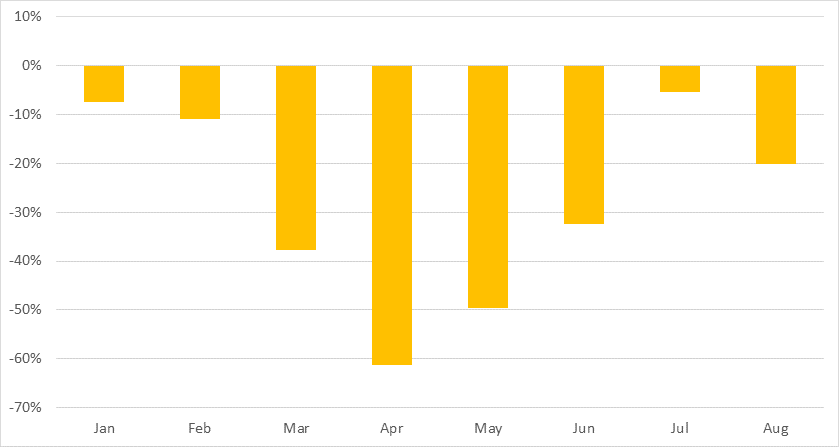New-car registrations in Germany fell by 20% in August
03 September 2020

3 September 2020
German new-car registrations fell by 20% in August, compared to the same month in 2019. A total of 251,044 new cars were registered according to the latest figures published by the automotive authority Kraftfahrt-Bundesamt (KBA) today (3 September).
The decline in Germany follows the downward trend in France, Spain and Italy last month, and was the greatest contraction in the four major continental markets. This also marks a return to the double-digit declines suffered in Germany between February and June. In July, new-car registrations fell by only 5.4% year-on-year, buoyed by the increased incentives (from €6,000 to €9,000) for battery-electric vehicles (BEVs) and plug-in hybrids (PHEVs) introduced at the start of the month. However, the majority of cars are not benefitting from the stimulus, hence the downturn.
New-car registrations, Germany, year-on-year percentage change, January to August 2020
 Source: KBA
Frozen ICE
As cars powered with internal combustion engines (ICE) are not subsidised, registrations of new petrol and diesel cars plummeted by 38.8% and 26.7% respectively in August compared to August 2019. Nevertheless, petrol cars still accounted for 47% of the German market and diesel cars 28%. In other words, three out of four cars registered were ICE-powered and not eligible for the extended incentives.
Not surprisingly, however, electrified vehicles enjoyed treble-digit increases in demand in August. The number of BEVs registered increased by 221.5% to 16,076 units, gaining a market share of 6.4%. Registrations of new hybrids rose by 132.7% to 46,188 units, accounting for 18.4% of the market. Of these, 17,095 units were PHEVs, which surged by a phenomenal 447.9% year-on-year to capture a 6.8% market share. One positive consequence of the changing market mix is that the average CO2 emissions of newly registered cars decreased by -11.1% to 140.1g per kilometre.
Brand performance
Among the domestic carmakers, BMW and Mini were the only German brands to record growth in August, up 15.2% and 3.3% respectively. All other German brands suffered declines, which were most pronounced for Smart (-71.1%), followed by Porsche (-49.5%), Opel (-46.8%), Audi (-35.0%), Ford (-26.1%) and Mercedes (-3.7%). With a share of 17.5%, VW was again the brand with the highest volume of registrations, despite also suffering a 16.9% fall in demand in the month.
Tesla enjoyed the strongest growth among the import brands, registering a phenomenal 454% more cars during August than in the same month in 2019. This was followed by double-digit growth for Jeep (40.3%), Nissan (13.5%) and DS (11.9%), and single-digit increases by Toyota (8.9%), Honda (1.4%) and Fiat (1.0 %). Significant declines in year-on-year registration were recorded by Jaguar (-69.0%), Dacia (-63.9%), Land Rover (-58.2%), SEAT (-40.2%), Ssangyong (-39.0%), Suzuki (-34.4%) and Mazda (-34.1%). Despite registering 20% fewer new cars in August 2020 than in August 2019, Skoda gained the largest share (6.2%) among imported brands.
Source: KBA
Frozen ICE
As cars powered with internal combustion engines (ICE) are not subsidised, registrations of new petrol and diesel cars plummeted by 38.8% and 26.7% respectively in August compared to August 2019. Nevertheless, petrol cars still accounted for 47% of the German market and diesel cars 28%. In other words, three out of four cars registered were ICE-powered and not eligible for the extended incentives.
Not surprisingly, however, electrified vehicles enjoyed treble-digit increases in demand in August. The number of BEVs registered increased by 221.5% to 16,076 units, gaining a market share of 6.4%. Registrations of new hybrids rose by 132.7% to 46,188 units, accounting for 18.4% of the market. Of these, 17,095 units were PHEVs, which surged by a phenomenal 447.9% year-on-year to capture a 6.8% market share. One positive consequence of the changing market mix is that the average CO2 emissions of newly registered cars decreased by -11.1% to 140.1g per kilometre.
Brand performance
Among the domestic carmakers, BMW and Mini were the only German brands to record growth in August, up 15.2% and 3.3% respectively. All other German brands suffered declines, which were most pronounced for Smart (-71.1%), followed by Porsche (-49.5%), Opel (-46.8%), Audi (-35.0%), Ford (-26.1%) and Mercedes (-3.7%). With a share of 17.5%, VW was again the brand with the highest volume of registrations, despite also suffering a 16.9% fall in demand in the month.
Tesla enjoyed the strongest growth among the import brands, registering a phenomenal 454% more cars during August than in the same month in 2019. This was followed by double-digit growth for Jeep (40.3%), Nissan (13.5%) and DS (11.9%), and single-digit increases by Toyota (8.9%), Honda (1.4%) and Fiat (1.0 %). Significant declines in year-on-year registration were recorded by Jaguar (-69.0%), Dacia (-63.9%), Land Rover (-58.2%), SEAT (-40.2%), Ssangyong (-39.0%), Suzuki (-34.4%) and Mazda (-34.1%). Despite registering 20% fewer new cars in August 2020 than in August 2019, Skoda gained the largest share (6.2%) among imported brands.
 Source: KBA
Frozen ICE
As cars powered with internal combustion engines (ICE) are not subsidised, registrations of new petrol and diesel cars plummeted by 38.8% and 26.7% respectively in August compared to August 2019. Nevertheless, petrol cars still accounted for 47% of the German market and diesel cars 28%. In other words, three out of four cars registered were ICE-powered and not eligible for the extended incentives.
Not surprisingly, however, electrified vehicles enjoyed treble-digit increases in demand in August. The number of BEVs registered increased by 221.5% to 16,076 units, gaining a market share of 6.4%. Registrations of new hybrids rose by 132.7% to 46,188 units, accounting for 18.4% of the market. Of these, 17,095 units were PHEVs, which surged by a phenomenal 447.9% year-on-year to capture a 6.8% market share. One positive consequence of the changing market mix is that the average CO2 emissions of newly registered cars decreased by -11.1% to 140.1g per kilometre.
Brand performance
Among the domestic carmakers, BMW and Mini were the only German brands to record growth in August, up 15.2% and 3.3% respectively. All other German brands suffered declines, which were most pronounced for Smart (-71.1%), followed by Porsche (-49.5%), Opel (-46.8%), Audi (-35.0%), Ford (-26.1%) and Mercedes (-3.7%). With a share of 17.5%, VW was again the brand with the highest volume of registrations, despite also suffering a 16.9% fall in demand in the month.
Tesla enjoyed the strongest growth among the import brands, registering a phenomenal 454% more cars during August than in the same month in 2019. This was followed by double-digit growth for Jeep (40.3%), Nissan (13.5%) and DS (11.9%), and single-digit increases by Toyota (8.9%), Honda (1.4%) and Fiat (1.0 %). Significant declines in year-on-year registration were recorded by Jaguar (-69.0%), Dacia (-63.9%), Land Rover (-58.2%), SEAT (-40.2%), Ssangyong (-39.0%), Suzuki (-34.4%) and Mazda (-34.1%). Despite registering 20% fewer new cars in August 2020 than in August 2019, Skoda gained the largest share (6.2%) among imported brands.
Source: KBA
Frozen ICE
As cars powered with internal combustion engines (ICE) are not subsidised, registrations of new petrol and diesel cars plummeted by 38.8% and 26.7% respectively in August compared to August 2019. Nevertheless, petrol cars still accounted for 47% of the German market and diesel cars 28%. In other words, three out of four cars registered were ICE-powered and not eligible for the extended incentives.
Not surprisingly, however, electrified vehicles enjoyed treble-digit increases in demand in August. The number of BEVs registered increased by 221.5% to 16,076 units, gaining a market share of 6.4%. Registrations of new hybrids rose by 132.7% to 46,188 units, accounting for 18.4% of the market. Of these, 17,095 units were PHEVs, which surged by a phenomenal 447.9% year-on-year to capture a 6.8% market share. One positive consequence of the changing market mix is that the average CO2 emissions of newly registered cars decreased by -11.1% to 140.1g per kilometre.
Brand performance
Among the domestic carmakers, BMW and Mini were the only German brands to record growth in August, up 15.2% and 3.3% respectively. All other German brands suffered declines, which were most pronounced for Smart (-71.1%), followed by Porsche (-49.5%), Opel (-46.8%), Audi (-35.0%), Ford (-26.1%) and Mercedes (-3.7%). With a share of 17.5%, VW was again the brand with the highest volume of registrations, despite also suffering a 16.9% fall in demand in the month.
Tesla enjoyed the strongest growth among the import brands, registering a phenomenal 454% more cars during August than in the same month in 2019. This was followed by double-digit growth for Jeep (40.3%), Nissan (13.5%) and DS (11.9%), and single-digit increases by Toyota (8.9%), Honda (1.4%) and Fiat (1.0 %). Significant declines in year-on-year registration were recorded by Jaguar (-69.0%), Dacia (-63.9%), Land Rover (-58.2%), SEAT (-40.2%), Ssangyong (-39.0%), Suzuki (-34.4%) and Mazda (-34.1%). Despite registering 20% fewer new cars in August 2020 than in August 2019, Skoda gained the largest share (6.2%) among imported brands.